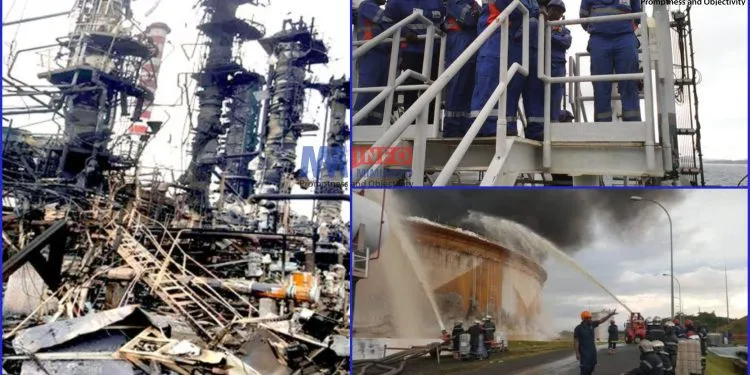Five years have elapsed since Prime Minister Dr. Joseph Dion Ngute initiated an inquiry to uncover the cause of the explosion that decimated four of Sonara’s 13 production units, the sole oil refinery in the country. The cataclysmic event occurred on May 31, 2019, shattering the refinery’s operations in Limbe. Initial reports attributed the blast to a technical malfunction triggered by frequent power outages.
However, in June of the same year, the Prime Minister commissioned an investigation led by Water and Energy Minister Gaston Eloundou Esomba. The inquiry comprised six experts drawn from various security agencies, including the Gendarmerie, National Security, and External Research.
Despite the passage of time, the findings of this commission remain undisclosed, leaving lingering doubts and unanswered questions surrounding the fire incident. The tragedy struck at a crucial juncture, just as the refinery was on the cusp of completing its second phase, poised to refine local or heavy crude. Originally designed by French engineers in 1981 to process only light crude, Sonara had relied on imports from Nigeria, Equatorial Guinea, and Angola to sustain its operations.
Meanwhile, Cameroon’s own heavy crude was being exported at reduced rates to European and American markets. The blaze dealt a severe blow to production, prompting the President to mandate Sonara and other licensed oil entities to import refined products to meet domestic demand.
Prior to the inferno, Sonara boasted a daily production output of 42,000 barrels of oil. Although the International Monetary Fund (IMF) had anticipated a resumption of Sonara’s refining activities in 2024, with a gradual capacity increase, specifics regarding the timeline remained elusive. The government estimated that a staggering 270 billion FCFA would be required for the refinery’s reconstruction post-disaster.
In 2020, negotiations commenced with Russian energy giant Lukoil for the reconstruction effort. Sonara, burdened by debt, posed not only a threat to the country’s petroleum supply but also endangered the stability of the national banking system due to its substantial financial commitments.
The inability of Cameroon to refine its own crude has led to soaring prices for petroleum products, exacerbated by the government’s decision to eliminate fuel subsidies in 2023. Consequently, shortages occasionally plague major urban centers like Yaounde and Douala, as imported fuel remains anchored offshore. Despite a recent change in Sonara’s leadership, the government, which holds an 80% stake in the refinery, has been reticent about its plans to revive production, opting instead to procure from external sources.
The timeline for the release of the investigation’s findings remains uncertain, perpetuating a veil of secrecy over Cameroon’s oil industry. Compounding matters, Cameroon’s suspension from the Extractive Industries Transparency Initiative underscores persistent concerns regarding transparency and corruption within the sector.
Notably, the country has yet to prosecute individuals implicated in receiving bribes from Glencore to undersell Cameroon’s oil—a stark contrast to the legal actions taken by other nations, such as the United States and the United Kingdom, resulting in significant penalties imposed on Glencore.



